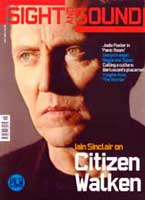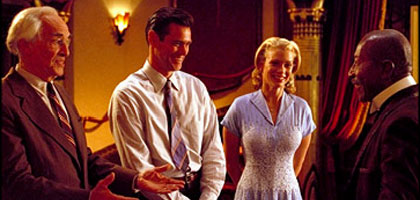
Majestic, The
USA/Australia 2001

Reviewed by Michael Bracewell
Synopsis
Our synopses give away the plot in full, including surprise twists.
Hollywood, 1951. B-movie screenwriter Peter Appleton (Jim Carrey) is blacklisted by HUAC for attending a Communist meeting as a student. His studio contract suspended, Appleton gets drunk and accidentally drives his car off a bridge miles out of town. Discovered on a beach by an old man, Appleton wakes up, having lost his memory. The man takes Appleton to the nearby town of Lawson.
There, Appleton is mistaken for Luke Trimble, a young man who went missing during World War II. Trimble's father Harry (Martin Landau), who owns the now-dilapidated picture house The Majestic, welcomes Appleton as his son. Law graduate Adele Stanton (Laurie Holden) isn't convinced (Luke was her fiancé), but shows Peter around town in an attempt to jog his memory. At a party given in his honour, Peter - who still can't recall his true identity - convinces the townsfolk, including Adele, that he is Luke with some virtuoso piano playing (Luke was a talented pianist). Having accepted that he is Luke, Peter reopens The Majestic and begins dating Adele. Spotting a poster for Sands of the Sahara, a B-movie he scripted, Peter's memory floods back; at the same time, Harry has a fatal heart attack.
Returning from the funeral, Peter is tracked down by the FBI, who believe he deliberately went missing. Leaving Lawson, Peter agrees to name other 'un-Americans' in return for re-establishing his Hollywood career. However, inspired by the heroic example of Luke's wartime service, Peter denounces the HUAC committee live on television. Returning to Lawson, he is welcomed back a hero.
Review
In the opening three minutes of The Majestic we are brought into the offices of a Hollywood studio, where the voices of a film production team are droning like drowsy wasps around the inert, unflickering features of Jim Carrey, playing a scriptwriter called Peter Appleton. It's a strangely understated opening which seems to promise well for the rest of the film. In a way that brings to mind the young Jack Lemmon, Carrey can create an entire narrative atmosphere simply by acting with his face (he'd also make a great Darren if they ever remade Bewitched) and it is this ability - boyish charm balanced on the edge of mania - that makes him such a mesmeric screen presence. With this in mind, Carrey's facial expression at the opening of The Majestic could remind you of the beginning of The Truman Show, where he acts out a scene from a melodramatic adventure story in his bathroom mirror.
And so here we are with Carrey's ambiguous, almost wounded stare, being ushered into a peach and saffron-lit Hollywood of the early 1950s, and somehow expecting The Majestic to declare itself as either a thought-provoking comedy of ideas like The Truman Show, or a more intense psychological study along the lines of Man on the Moon - in which Carrey gave a bravura performance as the volatile Andy Kaufman. (This was another Carrey film that made use of his staring face in the opening few minutes - like a tabula rasa of potential anarchy.) What follows in The Majestic, however, is a remarkably uneasy film in which an accretion of visual and spoken set-pieces seem to remain inert within their own predictability.
The Majestic's basic narrative trajectory, of ordinary guy discovering the hero inside himself - by way of McCarthyism, amnesia, small-town values and the renovation of an old picture house called The Majestic - seems, despite (or possibly because of) the many crescendos of emotion, to skid in a deep rut of clichés; and, with a supporting cast who seem more like a directory of stock types than actual characters, it is up to Carrey to bring the film to life. Which, at times, he manages, particularly in his deeply empathetic performance towards the end of the film, as a scared man pushed too far in front of the McCarthy tribunal.
When Carrey's Appleton loses his memory through a drunk-driving crash which leaves him washed up on a strange beach near the advert-picturesque small town of Lawson, you feel that this plot development could have provided Carrey with a role to hone his career-long obsession with playing characters who have split identities (even the Grinch was good guy and bad guy in one green body). For this is the territory in which Carrey excels: rendering explicit the internal contradictions that comprise a moral dilemma. Playing the Riddler in Joel Schumacher's Batman Forever, for example, he turned in a performance which was two parts Liberace to one part Marilyn Manson (with an Annie Lennox haircut) and managed to convey a kind of febrile pantomime of whacked-out schizoid nastiness - an effete Captain Hook by way of Jeff Koons. Vitally, Carrey's acting embodies the tension of opposites, and seems to require those roles which enable him to play on the stretched-taut strings of a character caught between Either and Or.
But The Majestic, despite pursuing the theme of split and double identity, has few shifts in its emotional climate. There is little dichotomous action to enrich the suspense, or heroic strangeness to bring out gradations of moral temper. As temporarily amnesiac Appleton is mistaken for small-town missing-in-action war-hero Luke Trimble (the stock types stack up), so each episode within the story, from the folkloric wisdom of the faithful black retainer (really) to the shining-eyed zeal for justice of Trimble's former fiancée (turned graduate lawyer) forms a pattern of edifying confession, and at times rather queasy-making lessons in truth and decency.
The Majestic, directed by the stolid Frank Darabont (The Shawshank Redemption), has much in common with the sentimental end of British comedies from the 1950s such as The Smallest Show On Earth or The Titfield Thunderbolt - in which the local is deemed universal and the homely villagers taken on the evils of the system and win. This is also a rich theme in American mythology, and is not without its charm, but there is a subtly bullying aspect to the morality of Lawson, which at times seems to balance the crowd of easy-going locals on the edge of becoming a mob (a point not lost on Preston Sturges' similarly plotted Hail the Conquering Hero, 1944). As such, America itself is seen to have a double identity - home of McCarthyism versus home of the brave - but the complexities of the divide, as embodied by Appleton perhaps, are only partially examined.
Clearly warm-hearted and aimed for the amber-lit feelgood factor, it maybe seems cynical to find sentimentality where there's meant to be real emotion. And as Carrey simply shines off the screen when he's given half the chance (when he's selling cinema tickets, for instance, in the freshly renovated Majestic theatre, there's a split-second of vintage Carrey eye-gleaming ambiguity) it makes you long for him to be given his range over a stronger and more original story. Carrey is the epitome of modernity, and The Majestic is an oddly archaic piece of work.
Credits
- Director
- Frank Darabont
- Producer
- Frank Darabont
- Screenplay
- Michael Sloane
- Director of Photography
- David Tattersall
- Editor
- Jim Page
- Production Designer
- Gregory Melton
- Music/Music Producer
- Mark Isham
